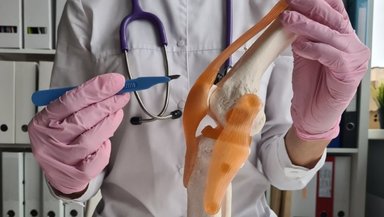Do I Really Need a Total Hip Replacement? Signs, Symptoms, & When to Consult a Surgeon

Medicine Made Simple Summary
Hip pain can start as a small problem but, over time, it may severely limit your ability to walk, sleep, or even perform everyday tasks. Total hip replacement (THR) is a surgery that replaces a damaged hip joint with an artificial one. But not every hip problem needs this procedure. In this blog, we explain in simple words what hip replacement is, signs that suggest you may need it, what doctors check before advising surgery, and when it’s best to consult a specialist for help.
Understanding the Hip Joint
The hip is a ball-and-socket joint. The “ball” is the top part of your thigh bone (femur), and the “socket” is part of your pelvic bone. Healthy hips have smooth cartilage that allows painless movement. When this cartilage wears away or the joint is damaged, bones rub against each other. This causes pain, stiffness, and reduced mobility.
Common reasons for hip damage include:
- Osteoarthritis, which comes with age and wear and tear.
- Rheumatoid arthritis, an autoimmune condition that inflames joints.
- Avascular necrosis, where blood supply to the hip bone is cut off, leading to bone collapse.
- Severe hip fractures or injuries.
Total hip replacement (THR) is a surgery in which the damaged ball and socket of the hip are removed and replaced with artificial implants. These implants are usually made of metal, ceramic, or plastic. The new joint is designed to reduce pain and restore mobility.
THR is one of the most successful surgeries in orthopedics. Many patients go back to leading normal, active lives. But because it is major surgery, doctors do not recommend it unless it is truly necessary.
Signs You May Need a Hip Replacement
People often delay consulting a doctor, hoping pain will improve with rest, medication, or physiotherapy. But certain signs may indicate that your hip joint is too damaged and conservative methods will not help much.
- Persistent and Severe Pain: If hip pain is constant—even while sitting or lying down—it could mean advanced joint damage. Pain that interrupts your sleep or daily life should not be ignored.
- Difficulty in Walking or Standing: If you limp, find it hard to climb stairs, or need support to walk short distances, your hip may no longer be functioning properly.
- Limited Range of Motion: If your hip feels stiff, making it difficult to bend, sit cross-legged, or tie your shoes, this could point to severe cartilage damage.
- Pain Not Controlled by Non-Surgical Treatments: Doctors usually first advise weight loss, physiotherapy, walking aids, or medicines like anti-inflammatory drugs. If these do not help anymore, surgery might be considered.
- Visible Deformity or Shortening of the Leg: In some cases, hip disease causes the affected leg to appear shorter or twisted, which can affect balance and posture.
Who Typically Needs a Hip Replacement?
Hip replacement is not only for older people. While it is common after age 60, younger patients may need it too, especially in cases of:
- Avascular necrosis after steroid use or accidents.
- Severe arthritis in patients as young as their 30s or 40s.
- Sports injuries or congenital hip deformities.
However, surgeons try to delay hip replacement in very young patients because implants have a limited lifespan (15–20 years on average), and revision surgery later may be required.
When to Consult a Surgeon
If your hip pain is interfering with work, exercise, or basic daily activities, it’s time to consult an orthopedic surgeon. Waiting too long can cause more damage, weaken surrounding muscles, and make recovery harder.
A surgeon will usually:
- Take a detailed history of your symptoms.
- Perform a physical examination of hip movement.
- Order X-rays or MRI scans to check joint condition.
- Suggest conservative treatments before surgery, if possible.
What Doctors Consider Before Recommending Surgery
Not every patient with hip pain is advised surgery. Doctors weigh several factors before recommending hip replacement:
- Severity of pain: Is it daily and disabling?
- Impact on quality of life: Does it stop you from working or moving freely?
- X-ray findings: Does the joint show severe arthritis or bone collapse?
- Failure of other treatments: Have medicines, injections, or physiotherapy failed?
- Overall health: Are you fit enough for surgery and recovery?
Alternatives to Total Hip Replacement
Before advising surgery, doctors may try other approaches:
- Painkillers or anti-inflammatory medicines.
- Physiotherapy and strengthening exercises.
- Lifestyle modifications like weight loss and use of walking aids.
- Injections such as corticosteroids or platelet-rich plasma (PRP).
These may provide temporary relief, but if the hip is severely damaged, only replacement surgery gives lasting improvement.
Risks of Waiting Too Long
Some patients delay surgery out of fear or financial reasons. But waiting too long can cause:
- Increased stiffness and loss of mobility.
- Muscle weakening around the hip.
- Worsening deformity, making surgery more complex.
- Higher risk of falls and injuries.
Early consultation ensures you get the right treatment at the right time.
Life After Hip Replacement
Patients often ask, “Will I be able to walk normally again?” The answer is usually yes. With proper surgery and rehabilitation:
- Most patients walk with support within a few days.
- Driving and work can often be resumed in 4–6 weeks, depending on recovery.
- Many enjoy activities like swimming, cycling, or light trekking after a few months.
Modern implants last 15–20 years or more, and sometimes lifelong, especially with newer materials.
Conclusion
If you or a loved one has hip pain that is affecting daily life, do not ignore it. Early consultation with an orthopedic surgeon can save years of suffering. Book an appointment with a joint replacement specialist to understand whether you need surgery now or if other treatments can still help. The right guidance can bring back comfort, movement, and quality of life.
References and Sources
American Academy of Orthopaedic Surgeons. Total Hip Replacement
*Information contained in this article / newsletter is not intended or designed to be a substitute for professional medical advice, diagnosis, or treatment. It is not a substitute for professional medical advice, diagnosis, or treatment. Always seek the advice of your physician or other professional health care provider with any questions you may have regarding a medical condition or advice in relation thereto. Any costs, charges, or financial references mentioned are provided solely for illustrative and informational purposes, are strictly indicative and directional in nature, and do not constitute price suggestions, offers, or guarantees; actual costs may vary significantly based on individual medical conditions, case complexity, and other relevant factors.
Verified by:







































